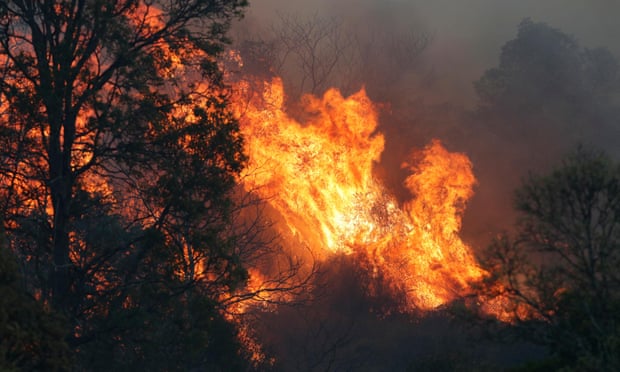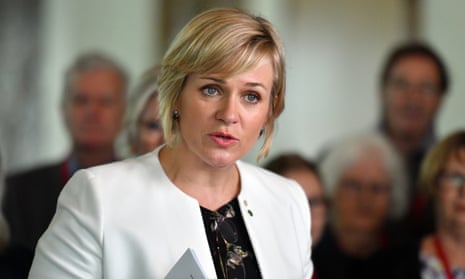The independent MP Zali Steggall is calling on self-styled “modern Liberals” to support legislation to establish a new climate change framework, warning them to ignore the views of their constituents “at their peril”.
Steggall, who toppled Tony Abbott in the Sydney seat of Warringah at the May 2019 election, largely on a platform of climate change action, is finalising draft legislation for a “national climate change framework” that sets out a roadmap for Australia to transition to a decarbonised economy.
The legislation is modelled on the UK’s Climate Change Act, passed in 2008, and mirrors framework laws in place in New Zealand and Ireland. Germany and Fiji are considering similar draft legislation.
Steggall aims to begin consultation on the draft bill later this month, and wants to introduce legislation in March, backed by a public campaign calling for a conscience vote in parliament.
Steggall would not reveal full details of the planned public campaign, but said she hoped it would be a similar “people-powered” movement to the same-sex marriage campaign that successfully galvanised support for a yes vote.
“My goal is to make sure all the people worried about bushfires and climate change, and drought and planning and agriculture in regional areas, and air pollution in urban areas – that they all be aware that this is on the table, and that this is an opportunity,” Steggall told Guardian Australia.
Steggall successfully secured more than $1m in donations for her campaign to oust Abbott, and has connections to wealthy progressive benefactors.
She said so-called modern Liberals, such as Dave Sharma in Wentworth, Tim Wilson in Goldstein and Jason Falinski in Mackellar, should ensure they put the interests of their electorate first and consider crossing the floor if the government opposed the bill as expected.
“I think they have to be mindful of their electorates feeling disenfranchised if they aren’t voting in accordance with their majority wishes,” Steggall said.
“The Liberal party is the party of the free vote – I am not asking them to do something they have never done before, and I think crossing the floor to vote for a climate act is something they need to do to represent their constituents.
“If you choose to ignore the amount of people in your electorate [who want stronger climate action] … you do so at your peril.”
Under Steggall’s bill, a statutory long-term target of net zero emissions by 2050 would be set, requiring five-yearly economy-wide carbon budgets to meet the goal.
Quick GuideClimate change and bushfires
Show

Does climate change cause bushfires?
The link between rising greenhouse gas emissions and increased bushfire risk is complex but, according to major science agencies, clear. Climate change does not create bushfires, but it can and does make them worse. A number of factors contribute to bushfire risk, including temperature, fuel load, dryness, wind speed and humidity.
What is the evidence on rising temperatures?
The Bureau of Meteorology and the CSIRO say Australia has warmed by 1C since 1910 and temperatures will increase in the future. The Intergovernmental Panel on Climate Change says it is extremely likely increased atmospheric concentrations of greenhouse gases since the mid-20th century is the main reason it is getting hotter. The Bushfire and Natural Hazards research centre says the variability of normal events sits on top of that. Warmer weather increases the number of days each year on which there is high or extreme bushfire risk.
What other effects do carbon emissions have?
Dry fuel load - the amount of forest and scrub available to burn - has been linked to rising emissions. Under the right conditions, carbon dioxide acts as a kind of fertiliser that increases plant growth.
So is climate change making everything dryer?
Dryness is more complicated. Complex computer models have not found a consistent climate change signal linked to rising CO2 in the decline in rain that has produced the current eastern Australian drought. But higher temperatures accelerate evaporation. They also extend the growing season for vegetation in many regions, leading to greater transpiration (the process by which water is drawn from the soil and evaporated from plant leaves and flowers). The result is that soils, vegetation and the air may be drier than they would have been with the same amount of rainfall in the past.
What do recent weather patterns show?
The year coming into the 2019-20 summer has been unusually warm and dry for large parts of Australia. Above average temperatures now occur most years and 2019 has been the fifth driest start to the year on record, and the driest since 1970.
Is arson a factor in this year's extreme bushfires?
Not a significant one. Two pieces of disinformation, that an “arson emergency”, rather than climate change, is behind the bushfires, and that “greenies” are preventing firefighters from reducing fuel loads in the Australian bush have spread across social media. They have found their way into major news outlets, the mouths of government MPs, and across the globe to Donald Trump Jr and prominent right-wing conspiracy theorists.
NSW’s Rural Fire Service has said the major cause of ignition during the crisis has been dry lightning. Victoria police say they do not believe arson had a role in any of the destructive fires this summer. The RFS has also contradicted claims that environmentalists have been holding up hazard reduction work.
A climate change risk assessment would be undertaken for all sectors, followed by a national adaptation program setting out how each sector needed to adapt to the effects of climate change that are already occurring. This includes higher temperatures, extended and hotter bushfire seasons, extended drought and floods.
Steggall is also proposing an independent expert body to replace the “powerless” Climate Change Authority, similar to the UK’s committee on climate change, which would advise on climate policy and report annually to parliament.
She said the framework legislation was not “prescriptive” and would allow flexibility for whichever party was in government to determine the best way to reduce emissions.
But she said it would demonstrate that Australia had a plan to decarbonise.
“There is nothing here that is outrageous, it is just setting that long-term goal of where we are heading and setting a framework of how we achieve it,” she said.
She said the bushfire crisis had forced Scott Morrison to acknowledge the role being played by climate change and there was a “strong public view that more needs to be done”.
Steggall has already begun talking to other independents about the legislation.
The Centre Alliance MP Rebekha Sharkie said she would support the bill, and called on moderate Liberals to do the same.
“Words are one thing but many members on the government side campaigned at the last election that they were supportive of more action on climate,” Sharkie said.
“They called themselves modern Liberals, it’s now time to put those words into action.
“This is going to need a whole-of-parliament approach in order to change what has been a 10-year policy vacuum in this place. I am right behind Zali on this.”
